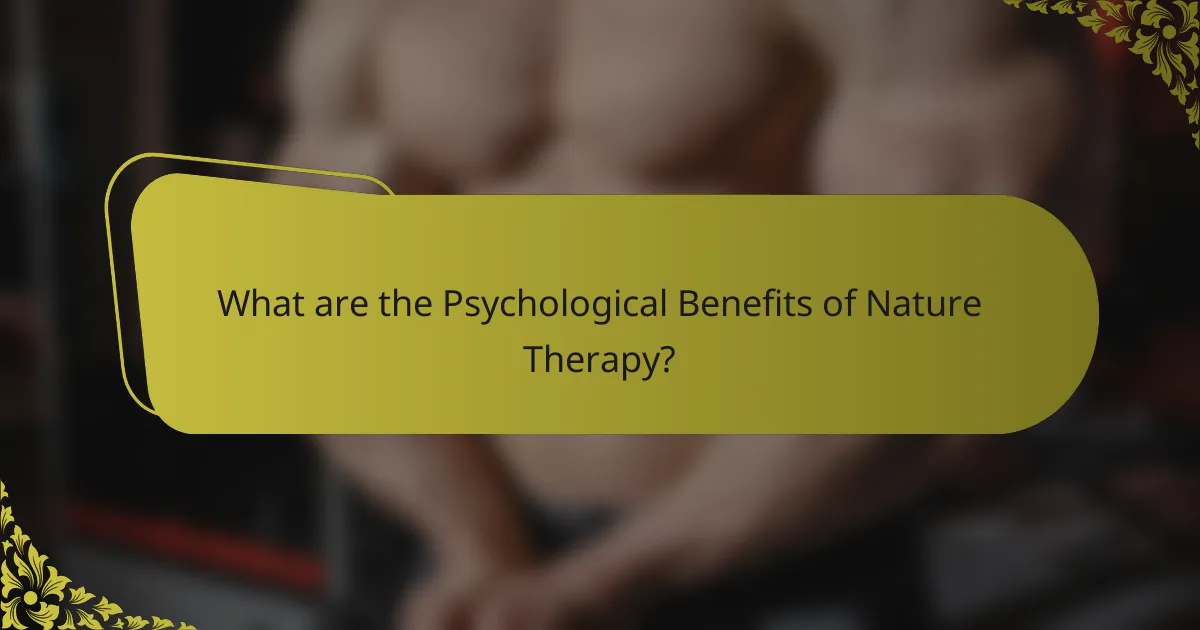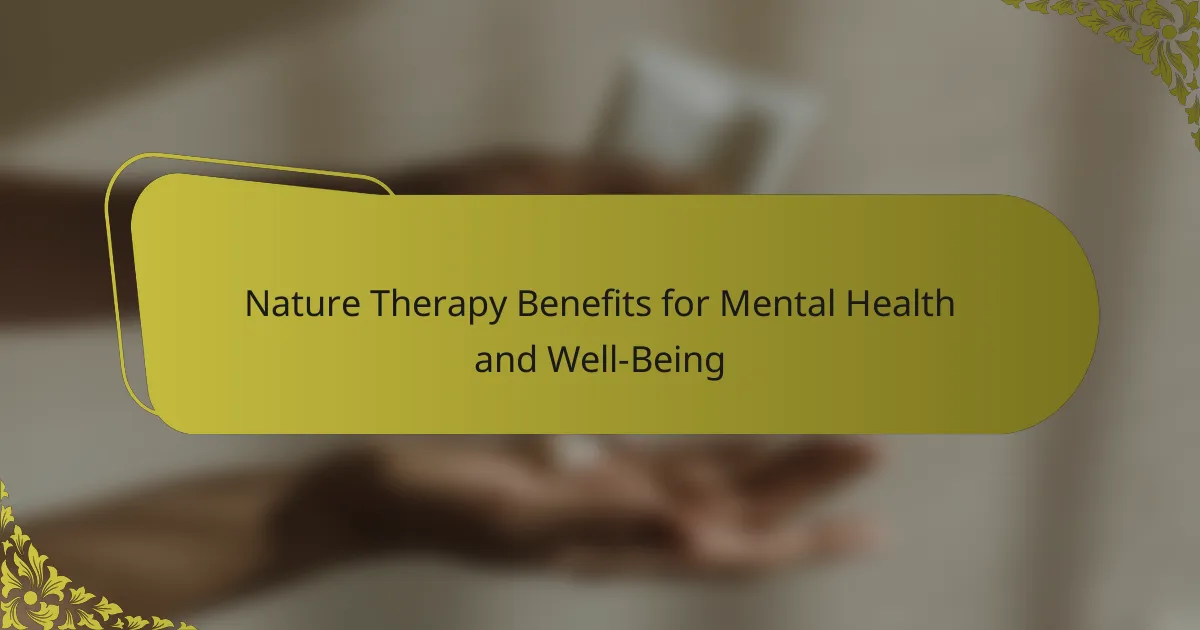Nature therapy significantly enhances mental health by reducing stress and improving mood. It promotes mindfulness and cognitive function while encouraging physical activity. Various forms, such as forest bathing and ecotherapy, offer unique benefits. Cultural practices shape its effectiveness, and challenges like accessibility can impact participation.

What are the Psychological Benefits of Nature Therapy?
Nature therapy significantly enhances mental health and well-being by reducing stress and improving mood. Exposure to natural environments fosters relaxation and emotional balance. Studies indicate that spending time in nature can lower cortisol levels, which are associated with stress. Nature therapy also promotes mindfulness, encouraging individuals to engage with their surroundings and cultivate a sense of presence. Additionally, it can improve cognitive function and creativity, as natural settings stimulate mental clarity. Engaging in nature therapy can lead to a more positive outlook on life and increased resilience against anxiety and depression.
How Does Nature Exposure Enhance Mood and Emotional Well-Being?
Nature exposure significantly enhances mood and emotional well-being by reducing stress and promoting relaxation. Studies show that spending time in natural environments lowers cortisol levels, which are linked to stress. Nature therapy can also improve mood and increase feelings of happiness. For example, individuals who engage in outdoor activities report higher life satisfaction and lower anxiety. The unique attribute of nature therapy is its ability to foster a sense of connection to the environment, which can lead to improved mental health outcomes. Engaging with nature not only benefits emotional well-being but also encourages physical activity, further enhancing overall health.
Which Mental Health Conditions Can Be Alleviated by Nature Therapy?
Nature therapy can alleviate various mental health conditions, including anxiety, depression, and stress. Research indicates that spending time in nature reduces cortisol levels and enhances mood. Nature therapy promotes mindfulness, which can help individuals manage symptoms of PTSD and ADHD. Engaging with natural environments fosters social connections and improves overall well-being.

What Evidence Supports the Effectiveness of Nature Therapy?
Nature therapy effectively improves mental health and well-being through various evidence-based benefits. Research indicates that spending time in natural environments reduces stress, anxiety, and depression. A study published in the Journal of Environmental Psychology found that participants who engaged in nature therapy reported a 20% decrease in stress levels.
Additionally, nature therapy enhances mood and cognitive function. The University of Utah conducted a study showing that individuals who spent time in nature experienced a 50% increase in creative problem-solving abilities.
Furthermore, nature therapy promotes physical activity, which is linked to better mental health. The World Health Organization states that outdoor activities can reduce symptoms of anxiety and depression.
These findings highlight the significant role of nature therapy in enhancing mental health and overall well-being, making it a valuable approach for individuals seeking to improve their mental health.
How Do Studies Measure the Impact of Nature Therapy on Mental Health?
Studies measure the impact of nature therapy on mental health through various methods, including surveys, physiological assessments, and observational studies. Researchers often use standardized questionnaires to evaluate participants’ mental well-being before and after nature therapy sessions. For example, the Perceived Stress Scale assesses stress levels, while the Profile of Mood States measures mood changes. Physiological metrics include heart rate variability and cortisol levels, indicating stress response. Observational studies document behavioral changes and emotional responses during nature interactions, providing qualitative insights. These combined approaches establish a comprehensive understanding of nature therapy’s benefits on mental health.
What Role Do Outdoor Activities Play in Nature Therapy Outcomes?
Outdoor activities significantly enhance nature therapy outcomes by improving mental health and well-being. Engaging in these activities fosters connection to nature, reduces stress, and promotes physical activity, leading to better emotional resilience. Research indicates that individuals participating in outdoor therapy report lower anxiety and depression levels. Unique attributes of outdoor activities, such as exposure to natural sunlight, can increase serotonin levels, further boosting mood. As a result, nature therapy becomes more effective when combined with outdoor experiences, maximizing its benefits for mental health.

How Does Nature Therapy Compare to Traditional Therapy Approaches?
Nature therapy offers unique benefits for mental health that differ from traditional therapy. Nature therapy enhances mood, reduces anxiety, and fosters a sense of connection to the environment. Studies show that spending time in natural settings can lower cortisol levels and improve overall well-being. Traditional therapy often focuses on cognitive approaches, while nature therapy emphasizes experiential and sensory engagement. This distinct approach can lead to increased mindfulness and emotional resilience, making it a valuable complement to conventional methods.
What Are the Unique Advantages of Nature Therapy Over Conventional Methods?
Nature therapy offers unique advantages for mental health and well-being compared to conventional methods. It promotes natural healing through immersive experiences in nature, reducing stress and anxiety levels effectively.
Nature therapy enhances mood and emotional resilience by fostering a deeper connection with the environment. Studies indicate that spending time outdoors can lower cortisol levels, leading to improved mental clarity and focus.
Additionally, nature therapy encourages physical activity, which is crucial for overall mental health. Engaging in outdoor activities can elevate endorphin levels, further boosting mood and reducing symptoms of depression.
Finally, nature therapy often incorporates mindfulness practices, enhancing self-awareness and emotional regulation. This holistic approach provides a comprehensive framework for mental well-being that conventional methods may lack.
Which Populations Benefit Most from Nature-Based Interventions?
Children, elderly individuals, and those with mental health disorders benefit most from nature-based interventions. These populations experience significant improvements in mood, anxiety reduction, and overall well-being through nature therapy.
Research indicates that children exhibit enhanced attention and reduced stress levels when engaging with natural environments. Elderly individuals often report lower levels of depression and greater social interaction following nature-based activities. Additionally, individuals with mental health disorders find solace and therapeutic effects in nature, which can lead to improved coping mechanisms and resilience.
Nature therapy fosters a sense of connection and belonging, which is vital for these populations. The restorative effects of natural settings are particularly impactful for those facing emotional and psychological challenges.

What Are the Different Forms of Nature Therapy Available?
Nature therapy offers various forms that enhance mental health and well-being. Common types include forest bathing, nature walks, gardening, and ecotherapy. Each form provides unique benefits such as stress reduction, improved mood, and increased mindfulness. Engaging with nature can foster emotional resilience and promote overall psychological health.
How Can Individuals Engage in Nature Therapy Practically?
Individuals can engage in nature therapy by immersing themselves in natural environments. Activities like hiking, gardening, or simply spending time in parks can significantly enhance mental health and well-being.
Research shows that spending time in nature reduces stress and anxiety. A study found that just 20 minutes outdoors can improve mood and reduce cortisol levels. Engaging in nature therapy also fosters mindfulness, allowing individuals to focus on the present moment.
Creating a routine that includes nature can be beneficial. For example, daily walks in a nearby park or weekend hikes can help establish a connection with the environment. This practice can lead to improved emotional resilience and overall happiness.
Incorporating nature therapy into daily life is practical and rewarding. Simple actions, such as taking breaks outside or cultivating indoor plants, can promote mental clarity and emotional stability.
What Are the Key Elements of a Successful Nature Therapy Session?
A successful nature therapy session includes a connection to the natural environment, structured activities, and supportive guidance. Key elements involve sensory engagement, mindfulness practices, and emotional processing. These aspects enhance mental health and well-being by reducing stress and promoting relaxation.
Effective sessions often incorporate physical movement, such as walking or gentle exercises, which further boost mood and cognitive function. Additionally, group dynamics can foster a sense of community, enhancing social support and shared experiences.

What Challenges Are Associated with Implementing Nature Therapy?
Implementing nature therapy faces challenges such as accessibility, environmental factors, and varying participant engagement. Limited access to natural spaces can hinder participation. Additionally, weather conditions may affect outdoor sessions. Engagement levels can vary, making consistent participation difficult. These factors can impact the effectiveness of nature therapy for mental health and well-being.
How Can Accessibility Issues Affect Participation in Nature Therapy?
Accessibility issues can significantly hinder participation in nature therapy. Physical barriers, such as uneven terrain or lack of wheelchair access, limit individuals with mobility impairments. Additionally, sensory challenges may prevent those with visual or hearing impairments from fully engaging in therapeutic activities. Mental health conditions, like anxiety or PTSD, may also be exacerbated in inaccessible environments. Ensuring inclusive practices enhances mental health benefits for all participants.
What Environmental Factors Influence the Effectiveness of Nature Therapy?
Environmental factors significantly influence the effectiveness of nature therapy. Key elements include the type of natural setting, climate conditions, and the presence of flora and fauna.
Natural settings like forests, parks, and beaches provide diverse sensory experiences that enhance mental well-being. For example, studies show that forest environments lower cortisol levels, promoting relaxation.
Climate conditions such as temperature and humidity can affect comfort levels during therapy sessions. Mild, pleasant weather encourages longer outdoor activities, which can enhance therapeutic benefits.
The presence of diverse flora and fauna contributes to the overall experience. Engaging with wildlife and plant life can evoke positive emotions, further supporting mental health outcomes.

What Unique Attributes Distinguish Nature Therapy Practices Across Cultures?
Nature therapy practices vary across cultures due to unique attributes like traditional beliefs, local flora, and therapeutic techniques. For example, Japanese Shinrin-yoku emphasizes forest bathing for stress relief, while Native American practices often incorporate rituals and storytelling connected to nature. In Scandinavian cultures, outdoor activities like friluftsliv promote mental health through nature immersion. These diverse approaches highlight how cultural contexts shape nature therapy’s effectiveness and benefits for mental well-being.
How Do Cultural Perspectives Shape the Understanding of Nature Therapy?
Cultural perspectives significantly influence how nature therapy is understood and practiced. Different cultures interpret the relationship between humans and nature uniquely, affecting therapeutic approaches.
For instance, Indigenous cultures often view nature as a living entity, fostering a deep connection that enhances mental well-being. In contrast, Western perspectives may emphasize nature’s restorative properties in a more scientific manner, focusing on evidence-based outcomes.
Research indicates that nature therapy can reduce anxiety and depression, with cultural beliefs shaping the methods and settings used. For example, community rituals in some cultures integrate nature therapy, promoting social cohesion and collective healing.
Ultimately, understanding these cultural nuances can enhance the effectiveness of nature therapy, making it more relevant to diverse populations.
Which Indigenous Practices Incorporate Nature for Healing?
Indigenous practices often incorporate nature for healing through various methods. These practices utilize natural elements to promote mental health and well-being.
For instance, Native American traditions emphasize the use of plants and herbs in healing rituals. This connection to nature fosters a sense of community and belonging. Similarly, Aboriginal Australians engage in land-based healing, recognizing the importance of the environment in mental health.
Research supports these practices, showing that nature exposure reduces stress and anxiety. The unique attribute of these Indigenous methods is their deep spiritual connection to the land. This holistic approach integrates physical, emotional, and spiritual healing, demonstrating the profound benefits of nature therapy for mental health.

What Are the Best Practices for Maximizing the Benefits of Nature Therapy?
To maximize the benefits of nature therapy, engage in regular outdoor activities, practice mindfulness in natural settings, and connect with local ecosystems. These practices enhance mental health and well-being by reducing stress and improving mood.
1. Schedule regular outdoor time to immerse yourself in nature.
2. Incorporate mindfulness techniques, such as deep breathing, while in natural environments.
3. Explore various ecosystems to foster a deeper connection with nature.
4. Join community nature programs to enhance social support and engagement.
5. Maintain a nature journal to reflect on experiences and emotions.
6. Limit screen time before and during nature therapy sessions to enhance focus.
How Can Individuals Create a Personalized Nature Therapy Plan?
Individuals can create a personalized nature therapy plan by identifying their mental health needs and preferences. Start by assessing personal goals, such as reducing anxiety or improving mood. Next, select specific natural settings that resonate, whether forests, beaches, or parks. Incorporate regular visits to these locations, aiming for at least 30 minutes each time. Additionally, consider integrating mindfulness practices, like meditation or journaling, during nature outings. Finally, track progress and adjust the plan based on what feels most beneficial, ensuring a tailored approach to enhance mental well-being.
What Common Mistakes Should Be Avoided When Practicing Nature Therapy?
To maximize the benefits of nature therapy, avoid common mistakes such as neglecting preparation, setting unrealistic expectations, and failing to engage with the environment. Proper planning enhances the experience, while realistic goals ensure a positive mindset. Engaging fully with nature, rather than passively observing, deepens the therapeutic effect.
